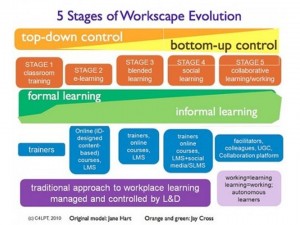
Harold Jarche » Network Learning: Working Smarter
At its core, network learning is a way to deal with an ever-increasing amount of digital information. It requires an open attitude toward learning and finding new things. Each worker needs to develop individualized processes of filing, classifying and annotating information for later retrieval.
Source: www.jarche.com
Network Learning: Working Smarter
Posted on October 22nd, 2010 by Harold Jarche

“In the period ahead of us, more important than advances in computer design will be the advances we can make in our understanding of human information processing – of thinking, problem solving, and decision making…” ~ Herbert Simon, Economics Nobel-prize winner (1968)
The World Wide Web is changing how many of us do our work as we become more connected to information and each other. In California, Ray Prock, Jr. (2010) uses a Web-based note system to store messages, manage his financial risk and stay on top of the multiple factors necessary to run a successful dairy farm. He is constantly learning as he works and has found a method to keep up, thanks to the Internet.
Continue reading “Network Learning to Team/Autonomous Learning”






